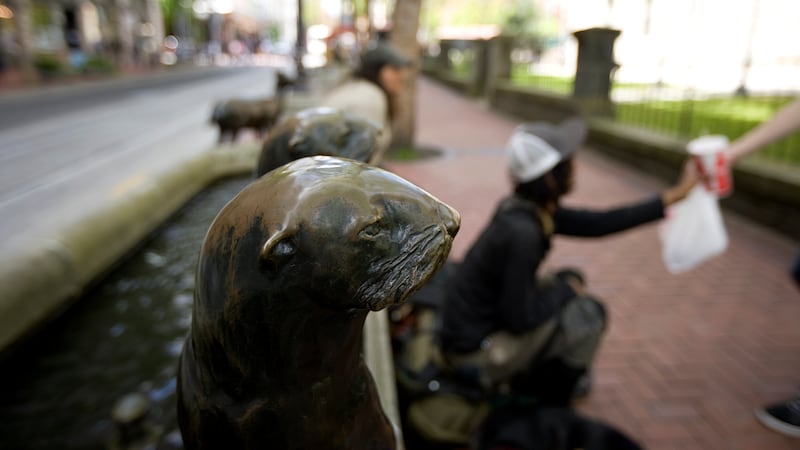A signature gatherer has filed complaints with the Oregon Elections Division and the Oregon Bureau of Labor and Industries alleging violations of elections law and wage theft.
The complaints, filed June 29 by Connea Derber, 22, of Beaverton, say that Derber went to work as a signature gatherer in May for a woman named Ancie Martinez of the signature-gathering firm Ballot Access LLC.
Derber says that Martinez put her to work gathering signatures for Initiative Petition 31, a measure that would clarify what legislation constitutes a tax increase and is therefore subject to the Oregon constitutional requirement that it be passed by a three-fifths majority of each legislative chamber.
But Derber, who had been working as a nanny, says she was far more interested in making money than exploring tax policy. In an interview, she tells WW that Martinez told her that she could make $30 an hour if she collected 10 signatures an hour—or far more if she hit quotas.
"You can make anywhere from $20-$90 an hour," Martinez told Derber in a text message submitted with the complaints.
Oregon elections law prohibits paying signature gathers according to how many signatures they gather, an obstacle Derber says she discussed with Martinez.
"They said we could make it look like I wasn't getting paid by the hour," Derber says.
In order to gather signatures, individuals must register with the state and wear a badge that identifies them as official signature gatherers for a particular measure.
Derber says there was nearly a three-week delay between when she began gathering signatures and when she got her badge. That could mean all the signatures she says she gathered for IP 31 are invalid.
Derber says that Martinez actually signed the signature sheets she gathered—she estimated there were 200 of them—which would also violate elections laws because the sheets are required to be signed by the person who actually gathered them.
Derber also alleges that Martinez stiffed her—that's the reason she filed a BOLI complaint as well as an elections complaint.
"[Martinez] got paid $90 an hour while I got paid $10 an hour," Derber says in her complaint. "It was very unfair. I worked very hard."
Martinez says she followed all elections laws and treated Derber fairly.
"Her allegations are completely untrue," Martinez tells WW.
Asked about her text message telling Derber that if she gathered 25 signatures an hour, she'd get paid $50 an hour, Martinez denied that constituted paying per signature. "It's just an hourly rate," she says.
Ballot Access owner Lee Vasche says Derber's complaint is unfounded.
"We know we are under a microscope and we comply with every aspect of the law," Vasche says. "There's nothing here."
Vasche says that elections law allows signature gathers to use quotas a guidelines but that all employees are strictly hourly.
"We do not pay by the signature," Vachse says. "If you do that, you're fired."
Vachse and his operations manager, Susan Mays, say that Mendez was not authorized to hire signature gatherers, nor do they believe that she signed signature sheets on Derber's behalf.
Mays says there was indeed a three week delay in Derber getting certified by the elections division but that she'd communicated regularly about that delay with Derber and told her she was not allowed to gather signatures until she got her badge.
"I let her know she couldn't gather signatures until she was registered," Mays says.
Vasche says he believes the complaint was "manufactured" by opponents of IP 31.
"I don't know why this young woman is disgruntled," he says. "This is just some strangeness between her and Ms. Mendez."
The political and legal stakes are high for Derber's complaint. Records show that the Tax is a Tax Committee—the backers of the initiative petition—paid $919,000 this year to the signature gathering company Ballot Access LLC. The committee turned in 174,000 signatures to the elections division on June 27. The agency then has 30 days from the July 6 submission deadline to determine whether the signatures are valid.
Our Oregon, the public-employee union backed non-profit that typically opposes conservative measures such as IP 31, says the elections division should take a hard look at Derber's allegations.
"This may be the most significant case of voter fraud since Bill Sizemore, it deserves the time to be fully examined," Our Oregon Executive Director Becca Uherbelau said in a statement. "The evidence paints a clear picture of disturbing and widespread fraud through forgery on signature sheets that, we believe, resulted in thousands of illegally obtained signatures."
Uherbelau also filed an elections complaint in response to Derber's allegations, urging the agency to investigate Derber's complaint before beginning the process of verifying the signatures for IP 31.
"Verification should not occur until the issues raised in Ms. Derber's statement are fully investigated," Uherbelau wrote in the complaint. "Otherwise, your office runs the risk of verifying an initiative petition that has not legally qualified for the ballot."
Debra Royal, chief of staff to Secretary of State Dennis Richardson, who oversees the elections division, acknowledged the receipt of Derber's complaint but did not immediately respond to questions about how and when it might be investigated.
